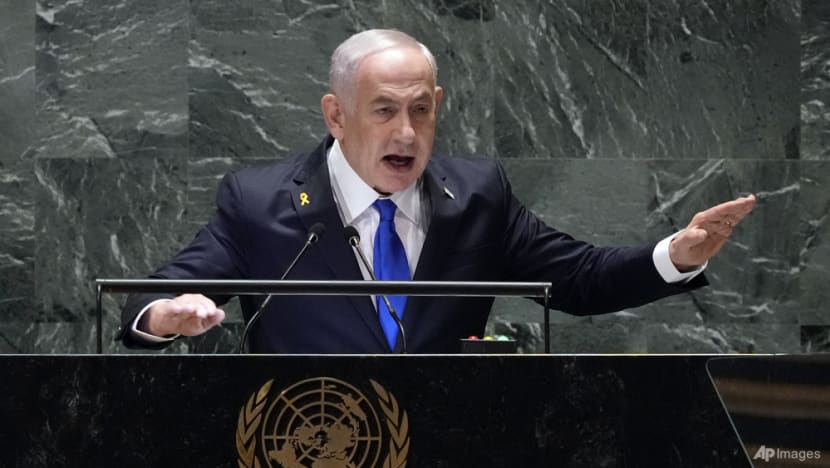Commentary: US support for Israel can’t stay ‘ironclad’ if Netanyahu keeps escalating
In 1914, Germany gave Austria-Hungary a “blank cheque”, which turned a regional conflict into World War I. The United States must not make the same mistake, says Bloomberg Opinion’s Andreas Kluth.

BERLIN: Of course the United States welcomed the killing of Hassan Nasrallah in a massive Israeli airstrike the other day (apparently with ordnance that included bunker-busting bombs made in America). As the leader of Hezbollah, Nasrallah had the blood of many victims on his hands, including Americans. His death, President Joe Biden said, brings “a measure of justice”.
And yet the Israelis had apparently failed to inform their most important ally in the White House of that airstrike in advance. It occurred within hours of a speech by Benjamin “Bibi” Netanyahu, the Israeli prime minister, at the United Nations, in which he called that institution “an antisemitic swamp” and threatened Iran (which backs Hezbollah) with war.
“There is no place in Iran that the long arm of Israel cannot reach,” he thundered, “and that’s true of the entire Middle East.”
By escalating in Lebanon just then, Netanyahu also snubbed a demand by the US and several of its other allies “for an immediate 21-day ceasefire across the Lebanon-Israel border.” The White House was understandably taken aback, because it had, according to a spokesperson, coordinated that ceasefire proposal with Netanyahu, who had told the Americans he was onboard.
Bad or no communication, verging on deception; diametric contradictions on crucial points of tactics and strategy: That, more or less, is how it’s been between the US and Israel, nominally the closest of allies (though without an explicit mutual defence treaty), since the massacre by Hamas on Oct 7, 2023.
Time and again, Biden has demonstrated and reaffirmed that American support for Israel is “ironclad” (his word), mainly to deter Iran and its other proxies.
He has also tried to restrain how Israel wages war in the Gaza Strip against Hamas, in Lebanon against Hezbollah, and elsewhere against Iran’s other proxies. The highest of his several goals has been to keep this conflict from igniting a regional or even global war.
HISTORICAL PARALLEL TO WORLD WAR I
That risk of World War III is bigger than it was a year ago.
Since then, the anti-Western regimes in Iran, Russia, China and North Korea have deepened their cooperation in sundry ways, from military to economic and diplomatic. They don’t have a formal four-way alliance, but they do increasingly behave like an “axis”. If any one of them were to fight directly against the US in one place, the others would be tempted to open additional fronts.
In this, and only this, way, there is a historical parallel to 1914. Then as now, the world had several conflicts that should in theory have been entirely unrelated.
Enmity between Serbia and Austria-Hungary had no connection, say, to the naval race between Imperial Germany and Great Britain. Similarly, today’s conflicts on the Korean peninsula or in the Taiwan Strait should have nothing to do with those in Ukraine and the Middle East.
In July 1914, however, the different confrontations suddenly and unexpectedly intertwined. And they did so because alliances that were meant to deter instead caused escalation, via feedback loops and vectors that the contemporaries had failed to foresee.
This is how it began: An ethnic Serb nationalist in the Balkans shot and killed the Austrian heir to the throne. Austria-Hungary had to retaliate. The question was how.
A week later Germany, Austria’s much more powerful ally, declared that its support for Vienna was ironclad (my word, now) – this was called the “blank cheque assurance”. Austria now took a risk it wouldn’t have incurred otherwise. It issued an ultimatum to Serbia. When the Serbians yielded to almost all of it, Austria attacked anyway.
But Serbia was allied to Russia, which mobilised. Seeing the war preparations to its east, Germany also got ready, but worried more about Russia’s ally in the west, France. When the French too mobilised, the Germans decided to strike preemptively.
But for that they had to go through Belgium, which was neutral. Once they did, the Brits entered the war. The rest is dark and bloody history.
ALLIANCES CHANGE THE RISK CALCULATION
Now forget all other historical details and focus just on the role of alliances and commitments, and the way those flipped, in a matter of days, from deterring aggression to automating escalation.
It’s not farfetched to see Hezbollah as Serbia, with Iran in the role of Russia. On the other side, Israel is Austria-Hungary, and America the big ally that was Germany then. In the wings are Russia and China today, as France and Britain were in 1914.
This is a perennial problem with alliances. Their purpose is to deter aggression against the ally, and for that they have to be credible as unconditional defensive pacts. (This is what former and possibly future president Donald Trump doesn’t understand about NATO.)
But alliances also change the calculation of risks, especially by the smaller partner. At worst, they encourage that ally to escalate or go on offence, in the expectation that the big guy has its back.
In the current American election season, there is no chance of either Biden or his potential successors, Trump or Kamala Harris, publicly withdrawing support from Israel. But all three must be clear (to Bibi, above all) that American support is indeed ironclad only for defensive purposes.
Say, however, that Netanyahu does extend the “long arm of Israel” across the region – that he bombs Iran’s nuclear centrifuges, for example – without coordinating that strategic shift with the United States. Israel is now clearly on offence, as it seems to plan in Lebanon. US support must now become conditional, rather than ironclad.
For America’s national interests as for the world’s collective sake, the White House must never issue blank cheques. Not even to its best friends.















